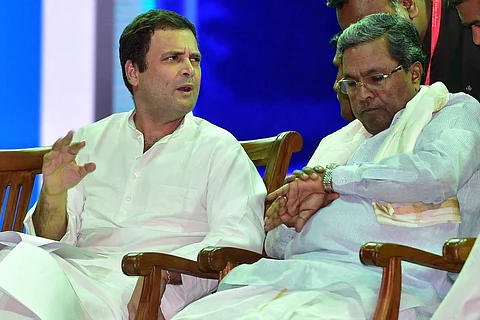

The chorus for an updated caste census is growing on a national scale. The governments of two states — Bihar and Odisha — have already expressed their commitment to holding caste-based surveys in their states. Congress leaders including Rahul Gandhi and All India Congress Committee (AICC) president Mallikarjun Kharge have been demanding that the findings of the Socio-Economic and Caste Census (SECC) — also called the 2011 caste census — conducted by the Manmohan Singh-led Union government be published. While the demand provides the opposition parties a manifesto to take on the Narendra Modi government on issues of social justice, it also exposes the Congress’s own hypocrisy.
The last caste census was conducted in India 92 years ago in 1931. Between 1951 and 2011, caste data related to Scheduled Castes and Scheduled Tribes alone was published. Karnataka holds the distinction of being the only state to have completed a comprehensive caste-based survey in decades. But here's the problem. The survey was conducted in 2015, and eight years later, the contents of the survey report are yet to be published.
In 2014, when Congress was in power in Karnataka, the then Chief Minister Siddaramaiah had ordered a Social and Educational Survey to be conducted by the Karnataka State Commission for Backward Classes. The government had said that the intent of conducting this survey was to better equip the state machinery to decide reservations and quotas in the Other Backward Classes (OBC) category as per the 127th Constitution Amendment Bill. The following year, in April and May of 2015, a total of 1.6 lakh government employees — teachers, lecturers and others — surveyed approximately 1.3 crore households across Karnataka. The exercise cost the state Rs 169 crore.
In April 2016, H Kantharaj, the then chairperson of the Karnataka State Commission for Backward Classes under whom the survey had begun, sought more time to publish the report saying data from a few districts including Bengaluru Urban were yet to be tabulated. In 2017, Kantharaj’s term was extended, with the then Social Welfare Minister H Anjaneya saying this was done to ensure that the report was completed. The minister had also insisted that the report was in its final stages. Later, members of the BC commission claimed that they had waited for ‘secondary’ data from educational institutions, and its delay had caused some discrepancies.
The issue has resurfaced several times in the last eight years, but successive governments have failed to publish the report.
In March 2021, there was an uproar in the Karnataka Legislative Council over the issue, with several Congress and JD(S) leaders including the then Opposition leader SR Patil, Marithibbe Gowda, KC Kondaiah, R Dharmasena, and AH Vishwanath asking for the report to be tabled. Kota Shrinivas Poojary, the Social Welfare Minister, placed the onus on the state BC Commission and claimed that it had not submitted the report to the state government yet. Ironically, Poojary himself had been most vehement in demanding that the report be made public when he was in the opposition.
Poojary had said that Kantharaj’s successor as the head of the BC Commission, MP Jayaprakash Hegde, who took charge in November 2020, was yet to formulate the results and submit the report.
Sources in Congress say that political pressure compelled the then government under Siddaramaiah to not make the report public. The leak of the key findings gives an indication for their reasons. Sources say that the survey revealed that the Scheduled Castes are the largest community in the state, with Muslims forming the second biggest block. For the longest time, Lingayats and Vokkaligas have dominated the political discourse with the narrative that they are the most numerically dominant castes in Karnataka. Leaders from the communities have banked on this to grow their political careers. The findings of the report have the potential to restructure power equations in Karnataka.
And now, as the Congress attacks the Modi government over the issue — with Rahul Gandhi demanding the release of national-level caste census data at a rally in Karnataka’s Kolar — their demand also draws attention to their own hypocrisy in the state.